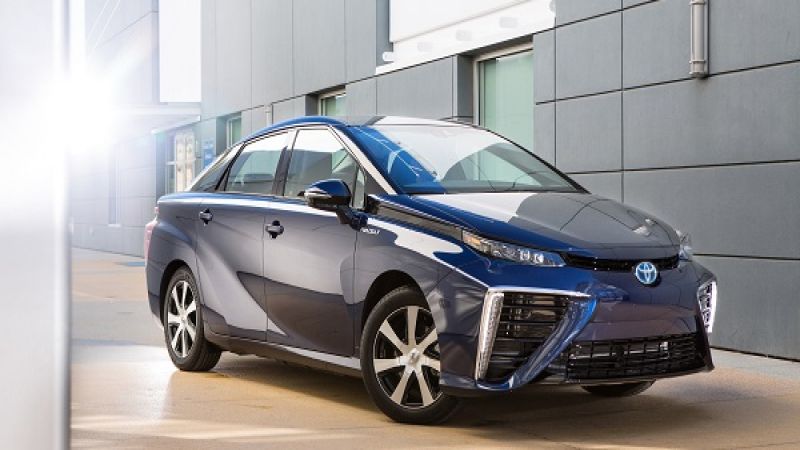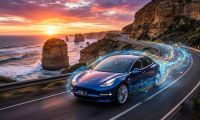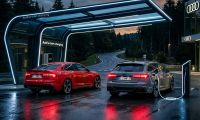Popular Science (PopSci) has named the Toyota FCV fuel cell electric vehicle to its Best of What’s New (BOWN) list for 2014. The annual list has run for more than a quarter century. PopSci’s editor calls the list “an unabashed celebration of the year’s greatest innovations, a glimpse of the future as it’s unfolding.” Some of the automotive trends that the magazine saw before they even hit the US market include the Toyota Prius, the world’s most popular and impactful green car.” He goes on to say of PopSci’s BOWN “We’re painting a picture of a better world.”
How The Toyota FCV Came To Exist
Toyota’s FCV fuel cell electric vehicle (FCEV) will be launched in the US market in California late next year. This is appropriate since it is primarily designed to maximize the California Air Resources Board’s (CARB) zero emissions vehicle (ZEV) mandates. CARB wants a percentage of the cars in its market to be “zero emissions” from their tailpipes. It has come up with a complex formula that includes hybrid cars, plug-in hybrids, extended range electric vehicles, battery electric vehicles, and fuel cell electric vehicles. One of the key ranking factors in the complex matrix that decides how much a given vehicle counts towards CARB's goals is range. The FCV nails that category. One seminar we attended this month on the subject indicated that a fuel cell vehicle with a range of over 300 miles might be worth three times more to an automaker in its efforts to meet CARB’s goals than an affordable battery electric vehicle (BEV). It is no surprise Toyota plans to go that route.
Hydrogen Infrastructure
PopSci commented on the Toyota FCV saying “Automakers have been reluctant to bet on hydrogen fuel cells, but Toyota has cast doubt aside and announced the first mass-market hydrogen car. The issue is infrastructure, but Toyota is betting FCVs will drive demand.”
I disagree with PopSci on this point. Based on my analysis of the situation, and from reading about the partnership that Toyota has in place with the State of California and its associated groups, I don’t think Toyota worries at all about the infrastructure. Why should Toyota worry that if it builds exactly what CARB wants, that CARB will somehow not support it with whatever infrastructure is required for the CARB-car to succeed? Toyota and other automakers are not in the business of refining or providing fuels. Tesla is trying that approach and despite the proud headlines announcing a new location in Upper Scubbobia, the company has 3 Superchargers to serve 2 New England states and exactly none to serve 4 New England States. Toyota is obviously going to help find ways for customers to use their car, but it will let CARB worry about the infrastructure.
Toyota Dominates Green Cars
Many battery electric advocates feel as if Toyota has “moved their cheese.” They are upset that a method to achieve clean personal transportation other than the one they feel is best is somehow a threat. Stepping back from the discussion on BEVs vs. FCEVs, it is easy to see that Toyota is now, and has long been, the global leader in green vehicles. Toyota presently has over 7 million hybrids on the road worldwide, more than half the total from all automakers combined. Prius is the top selling green vehicle model in California and has been for many years. The Prius also outsells the combined volume of the EV market in the US. Toyota has sold two fully electric vehicles in the US market and has often been the number two selling car with a plug in the electrified car marketplace with its Prius Plug-In. Toyota’s Corolla LE Eco also beats every other family car that runs on liquid fuel in terms of fuel economy and CO2 per mile.
PopSci’s selection of the FCV as one of the Best of What’s New 2014 is brave because many are not sure hydrogen fuel cell vehicles will succeed. Incredibly, some green car advocates are hoping that they won’t.
Related Stories:
Toyota, California, and FirstElement Fuel to build 100 hydrogen stations
When it comes to EVs and fuel cells, what is Toyota really thinking?
Toyota's new FCV fuel cell sedan concept hints it may skip EVs
Honda FCEV: 55 years in development and still waiting
Set Torque News as Preferred Source on Google












Comments
New Car FCV
Permalink
New Car FCV
I want a price list, Angola,
Permalink
I want a price list, Angola,